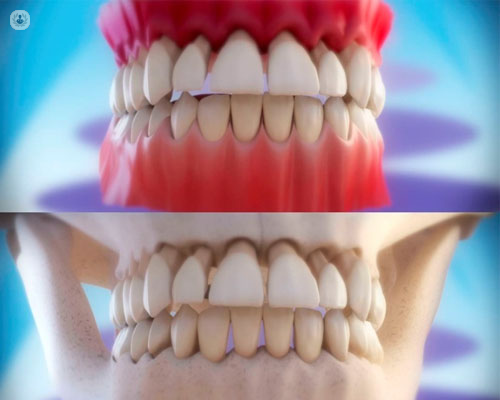

What is periodontics?
Periodontics is the branch of dentistry that treats diseases of the gums and bones supporting the teeth.

What types of periodontal disease are there?
The most common periodontal diseases are gingivitis and periodontitis. Gingivitis affects the gums, the soft tissues that protect the teeth. Periodontitis is more complex and causes infections in the bone that holds the teeth in place and in other tissues such as the periodontal ligament and the root.
What causes periodontal disease?
It is most commonly caused by the build-up of bacterial plaque on the teeth and gums, which eventually leads to tissue damage. These diseases cause redness and bleeding of the gums, either spontaneously or during brushing. Other causes include smoking, genetic inheritance, pregnancy, and certain diseases such as diabetes.
Factors that can cause gingivitis to progress to periodontitis include:
- Bacteria
- Genetic factors
- Stress
- Alcohol consumption
- Being overweight
- Smoking
- Systemic diseases (e.g. diabetes and osteoporosis)
- Drugs that cause gum overgrowth
- Poor oral hygiene habits
- Poorly positioned teeth
- Poorly fitted fillings
Tips for preventing the periodontal disease:
The best way to prevent periodontal disease is to maintain good oral hygiene, which controls the amount of plaque that builds up. Regular check-ups at the dentist are essential for an early diagnosis of the disease if it develops.
What does periodontal treatment involve?
Gingivitis is treated by professional prophylaxis (teeth cleaning), and root scaling and polishing in the case of periodontitis. Periodontal surgery may sometimes be necessary to remove bacteria, plaque, and tartar from the roots of the teeth.
